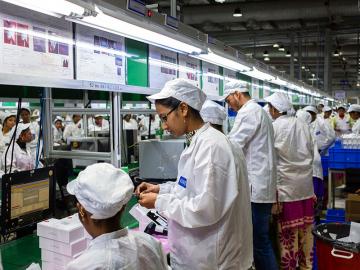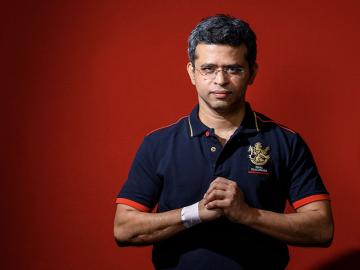
India's Next 10 Years
Letter from the Editor: The concept of inclusive growth suggests that the benefits of development must touch all our states in ample measure
There was considerable hoopla when the Indian economy crossed the trillion dollar mark for the first time three years ago. Over the next 10 to 15 years, it is now almost inevitable that our economy will touch $3 trillion. Last week, I had an interesting chat with K.V. Kamath, ICICI Bank’s non-executive chairman, about the implications of such phenomenal growth. Perhaps with the exception of China, nowhere in the world has one seen such a large mass of people go through a period of unprecedented growth. Even though China’s march began in 1978, the real boom in that economy started in 2000 and lasted for more than 10 years. During this period, per capita incomes have trebled there.
 On the other hand, India began its charge in 1991. And by 2025, per capita incomes are likely to move up three fold from the current base of about $1,000. Yet Kamath raised a significant question: How much do we really know what happens to a society that goes through such rapid change? China could have offered some clues, but no one is sure whether this transformation has been credibly recorded there. Now, when India steps up for her moment in history, it’ll perhaps offer a once-in-a-lifetime opportunity for researchers and media to chronicle this massive surge.
On the other hand, India began its charge in 1991. And by 2025, per capita incomes are likely to move up three fold from the current base of about $1,000. Yet Kamath raised a significant question: How much do we really know what happens to a society that goes through such rapid change? China could have offered some clues, but no one is sure whether this transformation has been credibly recorded there. Now, when India steps up for her moment in history, it’ll perhaps offer a once-in-a-lifetime opportunity for researchers and media to chronicle this massive surge. Set against the backdrop of last week’s Union Budget, that’s exactly what this special edition attempts to do. Associate Editor Dinesh Narayanan and Principal Correspondent Udit Misra lay out the big challenges facing the country over the next decade. Their essay picks up clues from the Budget speech and then focusses our attention on four hot-button issues that will keep our policy-makers awake at night.
We then pick up the four big bets that this government has made — education, homeland security, climate change and roads — and look at how each minister in charge is using a new approach to drive his agenda.
Finally, the concept of inclusive growth suggests that the benefits of development must touch all our states in ample measure. Yet in states like Bihar and Uttar Pradesh, the human development indices are almost as bad as that of African countries. So why can’t we learn to replicate the success in one state in another? We’ve picked out two important stories of transformation that offer critical lessons. Associate Editor Malini Goyal’s family quit Bihar more than a decade ago. Quietly but surely, under Chief Minister Nitish Kumar, Bihar has undergone a huge upheaval for the past four years. Malini returns to her home state to discover why good governance can make a difference even in a seemingly hopeless situation. Make sure you read her personal account on page 68.
The agricultural crisis has tormented the minds of policymakers and farmers alike. Some weeks ago, we found the answers in unexpected quarters: The state of Gujarat. In the last few years, Gujarat’s agrarian sector has grown at three times the national average. Consulting Editor R.N. Bhaskar travels to the hotspot to bring you an amazing story of agricultural revival. It underscores my belief that we don’t need new solutions. All we need is political will and foresight.
(This story appears in the 19 March, 2010 issue of Forbes India. To visit our Archives, click here.)
-
 R Panchapakesan
R PanchapakesanWe can even overtake china and be on top of the world , all we need in a united approach and conviction .
on Nov 25, 2013 -
 prashant sharma
prashant sharmai like the views of the write
on Jun 23, 2010 -
 Nitin Pahuja
Nitin PahujaThere is hardly any doubt that India's story of evolution is a unique one. Right from the service sector led growth to the demographic transformation, everything is certainly an opportunity to reinvent growth trajectories. While one can remain extremely positive about what is happening, I am a little concerned. Concerned about the tremendous threats that cloud as a global society. <br /> Carbon emissions, poaching, dwindling natural resources, income disparity and terrorism are problems that in my opinion as the future leader of the world we must address from right now. <br /> We are all ready to lead, but then why just lead on parameters that already exist, I think it is time to reinvent parameters rather than following them.
on Mar 4, 2010 -
 Sanjay Uvach
Sanjay UvachAnd now, Forbes set to re-discover Bihar. Affirmation of changes that are happening at the ground level. Biggest question is whether it will sustain.<br /> <br /> Sanjay Uvach<br /> Changing Bihar, slowly.
on Mar 5, 2010 -
 Riaz Haq
Riaz HaqImproved governance in Bihar is apparently helping boost economic growth and showing signs of the beginning of infrastructure construction. But it is not yet inclusive. It must translate into improved social indicators by making progress more inclusive. This is a challenge not just for Bihar, but for India as whole.<br /> <br />
on Mar 11, 2010 -
 A.aziz
A.azizFinally you said it. It's the political will we need. All other things we have. To become a developed nation the govt should concentrate especially on Housing for all those who are in rentals, Food -cheap and safe essential food, uninterrupted, cheap and safe services of electricity, water roads.
on Mar 17, 2010














